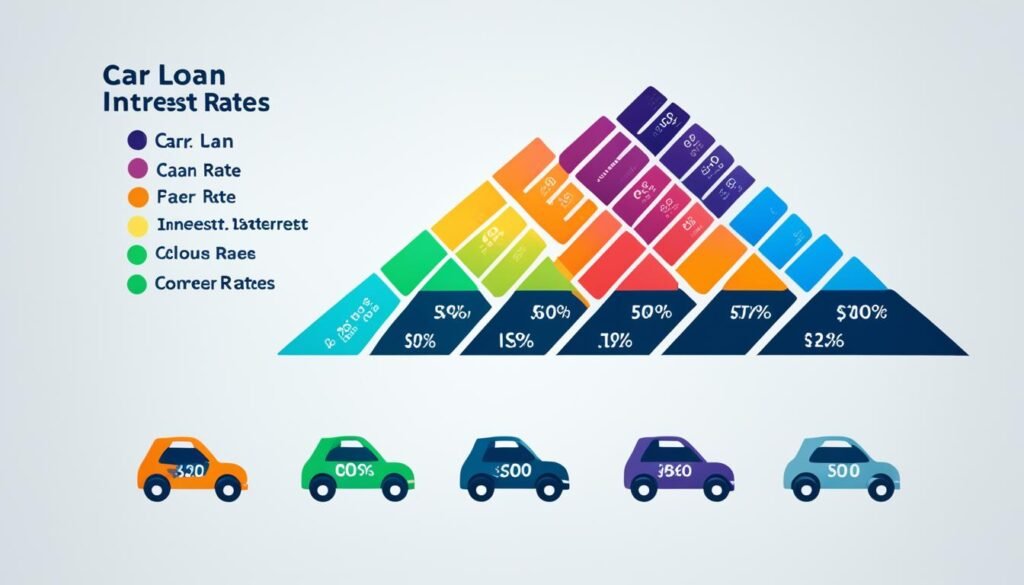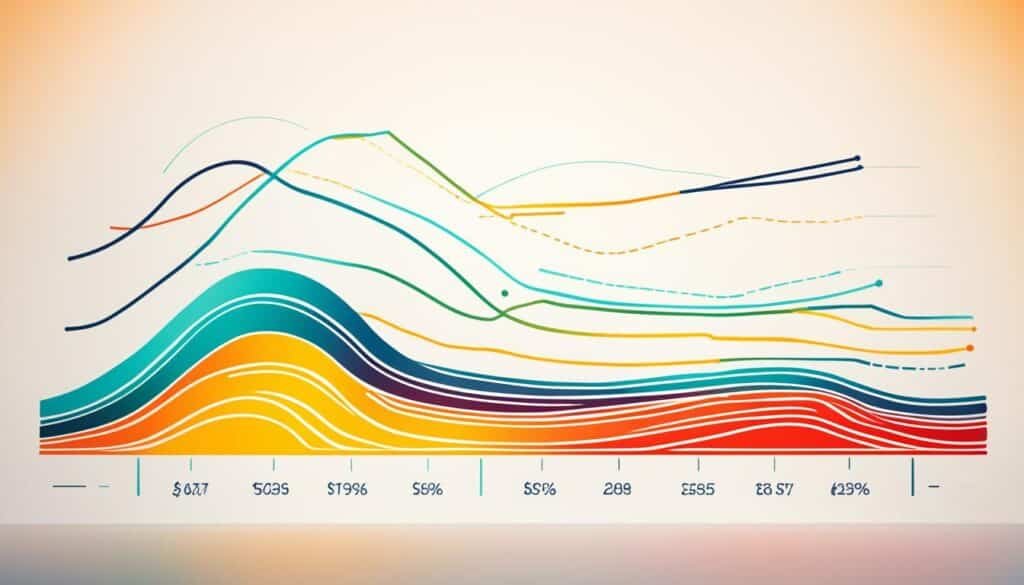Navigating the often complex world of car financing can be daunting for many car buyers. However, with a solid understanding of the key car loan terms and concepts, you can secure the best auto financing deal for your needs. This comprehensive guide will provide you with the essential knowledge to make informed decisions and successfully finance your next car purchase.
Whether you’re in the market for a new car or a used car, understanding the intricacies of loan terms, interest rates, down payments, and credit scores is crucial. By the end of this article, you’ll be equipped with the tools and insights to navigate the car loan process with confidence, ensuring that your car financing aligns with your budget and financial goals.
Key Takeaways
- Familiarize yourself with essential car loan terminology, including interest rates, loan durations, down payments, and credit scores.
- Understand the impact of these factors on your monthly payments and the total cost of the car purchase.
- Learn strategies to secure the best possible financing deal, whether you’re buying a new car or a used car.
- Discover ways to improve your credit score and negotiate better car loan terms.
- Be aware of additional costs and fees associated with the car purchase, beyond the loan amount.
Understanding Car Loan Terms
Comprehending the fundamental car loan terms and concepts is crucial for car buyers to make informed decisions. This section will delve into the importance of familiarizing oneself with key terminologies such as interest rates, loan durations, down payments, and credit scores. By understanding these essential elements, car buyers can ensure they are well-equipped to navigate the car loan process, ask the right questions, and ultimately secure a financing deal that aligns with their financial goals and budget.
Importance of Grasping Key Terminologies
Navigating the auto loan terminology and car financing vocabulary can seem daunting, but it is a necessary step in making a well-informed car purchase. By understanding the key car loan terms, car buyers can better evaluate the various financing options, compare lender offers, and make decisions that minimize the overall cost of their vehicle acquisition.
Ensuring an Informed Car Purchase
When it comes to understanding car loans, knowledge is power. By familiarizing themselves with the fundamental car loan terminology, car buyers can approach the financing process with confidence, ask the right questions, and make informed choices that align with their car buying education and financial situation. This, in turn, can lead to a more informed car purchase and a smoother overall car loan process.
Interest Rates and APR
One of the most crucial factors in a car loan is the
interest rate
, also known as the Annual Percentage Rate (APR). This interest rate directly impacts the monthly payments and the overall cost of the vehicle over the life of the loan.
Fixed vs. Variable Interest Rates
When it comes to car loan interest rates, buyers have two main options: fixed interest rates and variable interest rates. Fixed interest rates remain the same throughout the loan term, providing predictable and stable monthly payments. Variable interest rates, on the other hand, can fluctuate based on market conditions, which means the monthly payments may change over time. Understanding the differences between these two options is essential for car buyers to make an informed decision that aligns with their financial goals and risk tolerance.
Calculating the True Cost of Borrowing
To fully comprehend the impact of the car loan interest rates and APR, it’s crucial to calculate the true cost of borrowing over the life of the loan. This involves considering factors such as the total interest paid and the overall cost of the vehicle. By understanding the long-term implications of the interest rate, car buyers can make a well-informed decision and ensure they’re getting the best possible deal on their car purchase.

Loan Term and Monthly Payments
The car loan term, or the duration of the auto loan, is another crucial element that can significantly impact the monthly car payments and the overall cost of the vehicle. Navigating the tradeoffs between shorter and longer loan durations is essential for car buyers to strike a balance between affordability and minimizing the total interest paid over the life of the loan.
Shorter vs. Longer Loan Durations
Shorter loan lengths, such as 3 or 4 years, generally offer lower interest rates and result in paying less total interest over the life of the loan. However, this also means higher monthly car payments, as the principal amount is being paid off more quickly. Conversely, longer loan repayment periods, like 5 or 6 years, can provide more affordable monthly payments, but the overall total interest paid will be higher due to the extended auto loan duration.
Balancing Affordability and Total Interest Paid
To find the optimal car loan term, car buyers should carefully evaluate their financial situation and long-term goals. Factors such as the loan amount, down payment, and desired monthly payment should all be considered. By running the numbers and comparing the total interest paid for different loan lengths, buyers can make an informed decision that balances their immediate affordability and the overall cost of the car purchase.
| Loan Term | Monthly Payment | Total Interest Paid |
|---|---|---|
| 3 years | $500 | $2,500 |
| 5 years | $350 | $5,000 |
| 7 years | $275 | $7,500 |
By understanding the relationship between car loan term, monthly payments, and total interest paid, car buyers can make an informed decision that aligns with their budget and long-term financial goals.

Down Payments and Trade-Ins
When it comes to financing a car purchase, the size of the down payment and the trade-in value of the buyer’s current vehicle can have a significant impact on the overall car loan termsand the total cost of the transaction.
Benefits of a Larger Down Payment
Making a larger down payment on a car loan can provide several advantages. A higher down payment can lead to lower monthly payments, as the loan amount is reduced. Additionally, a larger down payment can result in reduced interest charges over the life of the loan, as the borrower is financing a smaller portion of the vehicle’s cost. This can translate to substantial savings in the long run, making the car loan more affordable and manageable for the buyer.
Maximizing Trade-In Value
The trade-in value of the buyer’s existing vehicle can also play a crucial role in the car loan process. To maximize the trade-in value , it’s important to ensure the vehicle is well-maintained, with a clean history and minimal wear and tear. Researching the trade-in value of similar models and negotiating with dealers can also help the buyer obtain the best possible price for their current car. By maximizing the trade-in value, the buyer can reduce the loan amount needed for the new vehicle, potentially leading to lower monthly payments and reduced interest charges over the life of the car loan down payment and trade-in value factors, car buyers can strategically structure their car loan to achieve more favorable terms, lower monthly costs, and ultimately, a more affordable and manageable car purchase.
down payment and trade-in value factors, car buyers can strategically structure their car loan to achieve more favorable terms, lower monthly costs, and ultimately, a more affordable and manageable car purchase.
Credit Score and Its Impact
Your car loan credit score plays a crucial role in determining the interest rate and overall terms you’ll be offered by lenders. Lenders use this three-digit number to assess the risk of lending to you, with higher credit scores typically resulting in more favorable auto loan deals. Understanding how your credit history and credit report impact your credit score is essential for securing the best possible financing for your next vehicle purchase.
Improving Your Credit Standing
If your credit score could use some work, there are several steps you can take to improve it before applying for a car loan. Regularly monitoring your credit report, paying your bills on time, and keeping credit card balances low are all effective ways to build and maintain a strong credit history. By taking proactive measures to improve your credit standing, you’ll be in a better position to qualify for lower interest rates and more favorable loan terms.
Negotiating Better Loan Terms
Once you understand your credit score’s impact on your car loan, you can leverage this knowledge to negotiate better terms with lenders. By shopping around and comparing offers from multiple financial institutions, you can use your strong credit profile to secure a lower interest rate or more favorable repayment schedule. Additionally, you can explore options with different lenders to find the best deal that aligns with your financial goals.

New vs. Used Car Financing
When it comes to financing a vehicle, the process can vary significantly depending on whether you’re purchasing a new car or a used car. Several key factors, such as the vehicle’s age, mileage, and overall condition, can impact the available financing options and the loan terms you’ll be offered.
For new car financing, the loan terms tend to be more favorable, with lower interest rates and the potential for special promotional offers from manufacturers or dealerships. New cars are also seen as a lower risk by lenders, as they have a longer expected lifespan and are more reliable than used vehicles. This can translate into longer loan durations, sometimes up to 72 or 84 months, and the possibility of lower monthly payments.
On the other hand, used car financing often comes with higher interest rates, as the vehicle’s age and mileage are perceived as higher risk factors. However, the overall cost of the loan may be lower due to the typically lower purchase price of a used car. Lenders may also impose stricter requirements, such as a larger down payment or a higher credit score, when it comes to financing a used vehicle.
Ultimately, the best financing options for new and used cars will depend on your specific financial situation, budget, and vehicle preferences. It’s important to carefully evaluate the pros and cons of each approach and work closely with your lender to secure the most favorable loan terms that align with your goals and needs.

Car Loan Terms
Navigating the car loan process can be daunting, especially for those unfamiliar with the common car loan terms, auto loan terminology, and car financing vocabulary. This section will dive deeper into the most essential concepts, providing clear definitions and explanations to help you fully understand the language used in the car loan agreement and car loan contract.
Also Read : Unlock Your Vehicle: Convenient Auto Loan Application
Decoding Common Car Loan Terminology
From interest rates and loan durations to down payments and credit scores, mastering the key car financing vocabulary is crucial for making informed decisions. By familiarizing yourself with terms like APR (Annual Percentage Rate), loan amount, and monthly payment, you’ll be better equipped to understand the true cost of your car loan and negotiate the best possible terms.
Ensuring Clear Communication with Lenders
Effective communication with lenders is essential when it comes to understanding car loan documents and securing favorable financing. Be prepared to ask questions about any unfamiliar terms or clauses in the car loan agreement, and don’t hesitate to seek clarification until you fully comprehend the car loan contract. A transparent dialogue with your lender will help you avoid surprises and ensure you make an informed decision that aligns with your financial goals.
| Common Car Loan Terms | Definition |
|---|---|
| APR (Annual Percentage Rate) | The true cost of borrowing, including interest and fees, expressed as a yearly rate. |
| Loan Amount | The total amount of money the lender is providing to finance the car purchase. |
| Loan Term | The length of the loan, typically measured in months or years. |
| Down Payment | The upfront amount the borrower pays towards the car’s purchase price. |
| Credit Score | A numerical representation of a borrower’s creditworthiness, which impacts loan terms. |
| Monthly Payment | The regular payment made to the lender to repay the car loan. |
Comparing Lenders and Rates
When it comes to securing a car loan, buyers have several options to consider, including banks, credit unions, and car dealerships. Each type of lender offers unique advantages and disadvantages, and understanding the differences can help car buyers make informed decisions and find the best car loan rates for their needs.
Banks vs. Credit Unions vs. Dealerships
Traditional banks are often a popular choice for bank auto loans, as they typically have a wide range of loan products and can offer competitive interest rates. However, credit unions can also be a great option, as they often provide credit union auto loans with lower rates and more favorable terms, especially for borrowers with good credit. On the other hand, dealership car financing can be convenient, but buyers should be cautious of potential hidden fees or less favorable interest rates compared to other lenders.
Online Loan Marketplaces and Comparison Tools
In recent years, the rise of online auto loan marketplaces and loan comparison tools has made it easier for car buyers to compare car loan lenders and find the best possible rates. These platforms allow buyers to quickly compare offers from multiple lenders, often with just a few clicks, making it easier to find the best car loan rates and negotiate the most favorable terms.
Pre-Approval and Negotiation Tactics
Obtaining a pre-approved car loan can provide buyers with a significant advantage in the negotiation process. By getting pre-approved for an auto loan before visiting a dealership, you’ll have a better understanding of your borrowing power and the ability to negotiate more effectively with dealers.
Advantages of Getting Pre-Approved
When you’re pre-approved for a car loan, you’ll know the exact amount you can borrow and the interest rate you qualify for. This information gives you the upper hand when it comes to negotiating car loan terms with the dealership. You can focus on the overall price of the vehicle and any additional features or upgrades, rather than getting bogged down in the financing details.
Leveraging Multiple Offers for Better Deals
Another effective strategy is to leverage multiple loan offers from different lenders to secure the best possible terms for your car purchase. By comparing offers from banks, credit unions, and online marketplaces, you can potentially secure the best car loan deal and car buying negotiation strategies that align with your financial goals.
The ability to negotiate car loan terms and leverage multiple loan offers can give you significant bargaining power when it comes to the final price of the vehicle and any additional fees or add-ons. By taking the time to get pre-approved and explore various financing options, you’ll be well-positioned to secure the best car loan deal for your needs.
Additional Costs and Fees
When it comes to financing a car, the loan amount and interest rate are not the only factors to consider. Car buyers should also be aware of the various additional costs and fees associated with the purchase, as these can significantly impact the total cost of ownership.
Understanding Taxes and Registration Fees
One of the most significant additional expenses in a car purchase is the sales tax and registration fees. Depending on the state and local jurisdiction, these can add hundreds or even thousands of dollars to the final price of the vehicle. It’s essential for car buyers to research the applicable taxes and fees in their area and factor them into their overall budget.
Avoiding Unnecessary Add-Ons and Extended Warranties
Dealerships often try to entice buyers with various add-ons and extended warranties, such as paint protection, fabric protection, or extended service plans. While some of these may have value, many are often overpriced and can significantly inflate the total cost of car ownership. Car buyers should carefully evaluate the necessity and cost-effectiveness of these additional products before agreeing to them, ensuring they don’t end up paying for unnecessary car add-ons that can drive up their auto loan fees.
By understanding the car loan additional costs and being proactive in budgeting for taxes and registration fees, as well as avoiding unnecessary extended warranties, car buyers can ensure they make an informed decision and minimize the overall financial impact of their vehicle purchase.
Conclusion
In this comprehensive guide, we’ve explored the key car loan terms and concepts that are essential for car buyers to understand when financing a vehicle purchase. By delving into the nuances of interest rates, loan durations, down payments, credit scores, and additional costs, readers are now equipped with the knowledge to navigate the car loan process with confidence and secure the best possible financing deal for their needs.
Armed with this information, car buyers can make informed decisions that align with their budget and financial goals, ensuring a successful and stress-free car buying process. The tips and strategies outlined in this guide will empower readers to compare lender options, negotiate better terms, and ultimately make the most of their car purchase financing.
In summary, this guide has provided the necessary insights and key takeaways on car financing to help car buyers achieve their goal of owning the vehicle of their dreams without compromising their financial wellbeing. By applying the principles and strategies discussed, readers can look forward to a successful car loan experience and a smooth transition into car ownership.
FAQs
What are the key factors that determine the interest rate on a car loan?
The main factors that determine the interest rate on a car loan include your credit score, the loan term, the type of vehicle (new or used), the lender, and current market conditions. Lenders use these factors to assess the risk of lending to you and set the appropriate interest rate.
How can I get the best interest rate on a car loan?
To get the best interest rate, you should focus on improving your credit score, making a larger down payment, and shopping around with multiple lenders, including banks, credit unions, and online lenders. Comparing rates and terms can help you secure the most favorable financing deal.
What is the difference between a fixed and variable interest rate on a car loan?
A fixed interest rate remains the same throughout the life of the loan, while a variable rate can fluctuate based on market conditions. Fixed rates provide more stability and predictability in your monthly payments, while variable rates may start lower but could increase over time, potentially leading to higher overall interest costs.
How do I calculate the total cost of a car loan?
To calculate the total cost of a car loan, you need to consider the loan amount, interest rate, and loan term. Use an auto loan calculator to input these variables and determine the total interest paid over the life of the loan, as well as your monthly payments.
What is the impact of a larger down payment on a car loan?
Making a larger down payment can significantly reduce the amount you need to borrow, which in turn lowers your monthly payments and the overall interest paid over the life of the loan. A larger down payment also helps you qualify for better interest rates and may shorten the loan term.
How does my credit score affect the car loan terms I’m offered?
Your credit score is one of the primary factors lenders use to determine the interest rate and loan terms they will offer you. Borrowers with higher credit scores are typically eligible for lower interest rates, longer loan terms, and more favorable financing options.
What are the differences between financing a new car versus a used car?
Financing a new car often comes with lower interest rates but higher purchase prices, while used car loans typically have higher interest rates but lower overall costs. The age and mileage of the vehicle can also impact the loan terms and availability of financing options.
What are the advantages of getting pre-approved for a car loan?
Getting pre-approved for a car loan before visiting a dealership can give you several advantages, including a better understanding of your borrowing power, the ability to negotiate more effectively, and the flexibility to shop for the best loan terms that fit your budget.
What additional costs and fees should I be aware of when financing a car?
In addition to the loan amount and interest, car buyers should be aware of other costs such as taxes, registration fees, and potential add-ons or extended warranties offered by the dealership. These additional expenses can significantly impact the total cost of ownership, so it’s important to budget for them accordingly.




